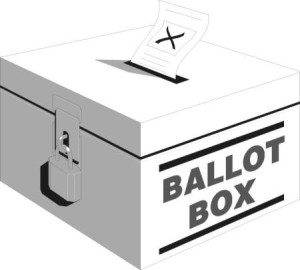by Kate Meyer
Second in a series focusing on state government organization. For Part 1 (DORA), click here
Introduction
Although the Department of State is officially contained within the statutory “Administrative Organization Act of 1968”, the organization is fundamentally related to the state constitution through its leader: the Secretary of State. This position is one of five “absolutely indispensable” executive branch officers specifically enumerated under Article IV, Section 1 of the Colorado constitution.
Similar to the “Attorney General’s Office” (Department of Law) and the “State Treasurer’s Office” (the Department of the Treasury), the Department of State is most commonly known by reference to its Article IV-created head: the “Secretary of State’s Office”. The Secretary is an elected officer who serves no more than two consecutive four-year terms. Click here for information on the current Secretary of State.
While the Department is perhaps best-known for its election-related responsibilities, it performs many other essential functions. To carry out these tasks, the Department is subdivided into four distinct divisions: Administration, Elections, Business & Licensing, and Information Technology.
Administration Division
As its name suggests, the Administration Division provides various support services. In addition to budgeting/accounting, human resources, and public/media communications, this Division provides several unique services. It monitors and authorizes the use of the official state seal, certifies the interest rate on appealed money judgments, plans and monitors legislation that affects the Department, and files official acts passed by the General Assembly.
Elections Division
The most visible duties discharged by the Department pertain to elections administration. The Secretary is charged with supervising the conduct of general, primary, congressional vacancy, and statewide ballot issues in Colorado, maintaining the statewide voter registration file, verifying initiative petition signatures, and administering campaign finance laws. Rules promulgated by the Secretary of State touch on every aspect of voting (from ensuring the confidentiality of voter information to standards for use of electronic and electromechanical voting systems). The Elections Division information can be accessed here.
The Secretary is charged with supervising the conduct of general, primary, congressional vacancy, and statewide ballot issues in Colorado, maintaining the statewide voter registration file, verifying initiative petition signatures, and administering campaign finance laws. Rules promulgated by the Secretary of State touch on every aspect of voting (from ensuring the confidentiality of voter information to standards for use of electronic and electromechanical voting systems). The Elections Division information can be accessed here.
Business & Licensing Division
The Business & Licensing Division performs a wide range of functions in the Department, including:
- Agency rulemaking: Every year, executive branch agencies generate thousands of pages of documents that create, modify, supplement, update, delete, and notify the public of, regulations. The “State Administrative Procedure Act” tasks the Secretary of State with publishing both the Colorado Register (which contains all notices of proposed rulemaking, the texts of proposed rules, new and amended rules, and Attorney General opinions relating to rules) and the Code of Colorado Regulations (which contains all current rules promulgated by executive agencies). The Colorado Register is published twice each month; both the Register and the Code are accessible online. The Secretary of State’s Office also maintains an electronic docket system for agency rules.
- Bingo and raffles regulation: The Secretary of State is the statutorily designated bingo and raffle licensing authority. In addition to providing licenses to eligible nonprofit organizations that wish to conduct bingo or raffle games, the Secretary of State’s Office certifies games managers; licenses devices, landlords, manufacturers, and suppliers; inspects facilities in which games are conducted; promulgates detailed rules for the conduct of games and disbursement of prizes; and supervises the administration and enforcement of Colorado’s bingo and raffle laws.
- Business Organizations: The Department of State processes various documents relating to business organizations, registers businesses, keeps related records, and issues certificates of good standing to business entities.
- Charities and fundraisers: The “Colorado Charitable Solicitations Act” directs the Department to register charitable organizations that solicit contributions in Colorado and their professional fundraising consultants and paid solicitors. The Secretary of State is statutorily directed to compile and publish registration information, assist nonprofits in complying with the law, promulgate rules to implement the law, and set fines for violations of laws and rules.
- Lobbyist Registration: Under the “Colorado Sunshine Law” (and in accordance with rules of the state House and Senate, Amendment 41 of the state constitution, and the state “Fair Campaign Practices Act”), the Secretary of State’s Office registers lobbyists, investigates claims of lobbyist misconduct, revokes certification or takes other actions when appropriate, and makes registration information available to the public.
- Notaries Public: A notary public is an individual appointed and commissioned to perform “notarial acts” such as administering oaths and affirmations, certifying documents, taking depositions and affidavits, and acting as a neutral witness to the signing of documents. The Department processes applications and fees for commissions and reappointments, takes disciplinary action against notaries when violations of laws and rules occur, and otherwise administers laws and rules applying to notaries.
- Uniform Commercial Code (UCC): The Secretary of State’s Office facilitates the filing of UCC records such as financing statements and notices of miscellaneous liens (including hospital liens, agistor’s liens, harvester’s liens, Colorado House and Finance Authority liens, restitution liens, and child support liens.
Information Technology Division
The Information Technology Division addresses the information systems needs of the entire Secretary of State’s office, including facilitating its web presence. The official website reflects the diverse functions undertaken by the Department, allowing users to do everything from register to vote to research businesses to read agency rules. The website can be accessed at http://www.sos.state.co.us
